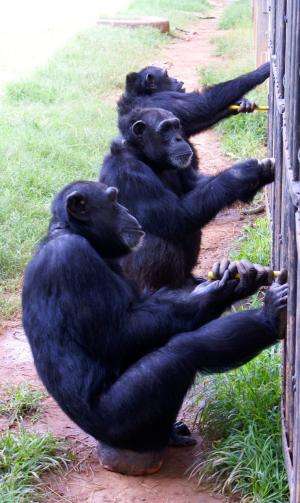Chimpanzees spontaneously initiate and maintain cooperative behavior

Without any pre-training or restrictions in partner choice among chimpanzees, researchers at the Yerkes National Primate Research Center, Emory University, found for the first time that chimpanzees housed in a socially complex, contained setting spontaneously cooperate with multiple partners of their choosing. This finding, which addresses long-standing doubt about the level of cooperation chimpanzees are able to spontaneously achieve or understand, is published in the June 12 issue of PeerJ.
"Cooperation among primates has attracted considerable research because of the evolutionary implications that such research has for human behavior and the ubiquity of cooperation among wild primates," says lead author Malini Suchak, PhD.
"Cooperation is often regarded as less puzzling than altruistic behavior, but only in an evolutionary sense. In the moment, cooperation often consists of a series of potentially complex decisions involving a choice of partners. When multiple partners are available, an individual must consider with whom to cooperate, if that individual has been a good partner previously, how much to invest in the partner, what to expect in return and if the cooperation will yield more benefits than solitary effort," Suchak continues.
In the study, which included Yerkes researchers Frans de Waal, PhD, Matt Campbell, PhD, and Tim Eppley, Suchak found the chimpanzees spontaneously cooperated 3,565 times over the course of 94 one-hour sessions. The chimpanzees' success rate and efficiency increased over time, whereas the amount of pulling in the absence of a partner decreased, demonstrating the animals had learned they needed a partner to succeed.
Suchak's study participants were all 11 members of a chimpanzee social group housed at the Yerkes Research Center Field Station in a large outdoor enclosure, which is a more complex environment than typical testing situations. In addition to allowing the chimpanzees to freely choose with which of their group mates they wanted to cooperate, Suchak's study is unique because it included dyadic and triadic cooperation, and it explored the dynamics of female cooperation, all of which can help provide information on the evolution of cooperative tendencies.
The study apparatus required that one chimpanzee (in the dyadic condition) or two chimpanzees (in the triadic condition) remove a barrier in order for another chimpanzee to simultaneously pull in a tray baited with food. The apparatus was mounted to the outdoor enclosure, allowing the chimpanzees to come and go as they wanted within each one-hour session.
"That the chimpanzees preferentially approached the apparatus when kin or non-kin of similar rank were present shows a preference for socially tolerant partners, and this demonstrates that in the midst of a complex social environment, chimpanzees spontaneously initiate and maintain a high level of cooperative behavior," Suchak says.
"Because previous research could only elicit cooperation in a much more controlled setting, we thought more complex, cooperative behavior might have uniquely evolved in humans. This study demonstrates chimpanzees are more cooperative than we realized, and we've yet to fully explore the extent of the similarities between chimpanzee and human behavior in this regard," Suchak concludes.
Established in 1930, the Yerkes National Primate Research Center paved the way for what has become the National Institutes of Health-funded National Primate Research Center (NPRC) program. For more than eight decades, the Yerkes Research Center has been dedicated to conducting essential basic science and translational research to advance scientific understanding and to improve human health and well-being. Today, the Yerkes Research Center is one of only eight NPRCs. The center provides leadership, training and resources to foster scientific creativity, collaboration and discoveries, and research at the center is grounded in scientific integrity, expert knowledge, respect for colleagues, an open exchange of ideas and compassionate, quality animal care.
Yerkes-based research programs are seeking ways to: develop vaccines for infectious and noninfectious diseases; increase understanding of progressive illnesses, such as Parkinson's and Alzheimer's diseases, and develop methods for the earliest possible diagnosis; unlock the secrets of memory; treat and even prevent autism spectrum disorders, fear and anxiety-related disorders, and drug addiction; advance knowledge about the evolutionary links between biology and behavior; and interpret brain activity through imaging.
Journal information: PeerJ
Provided by Emory University


















